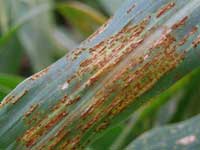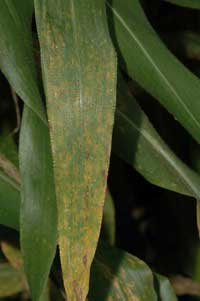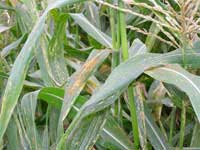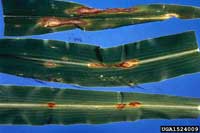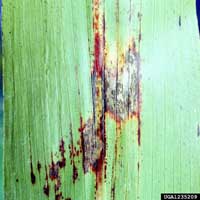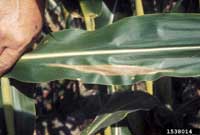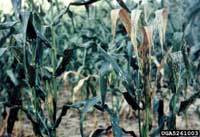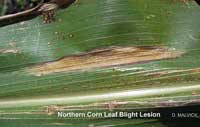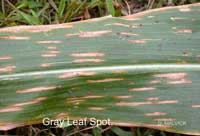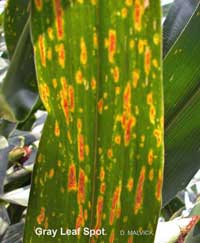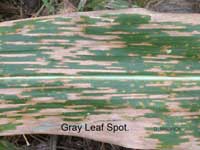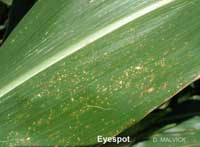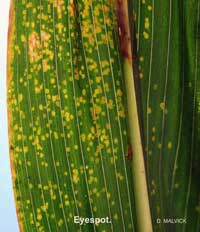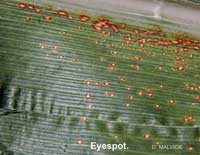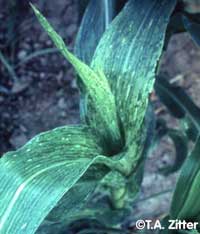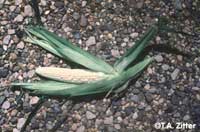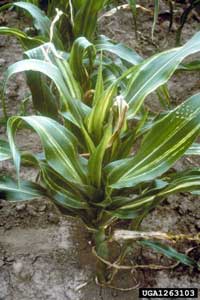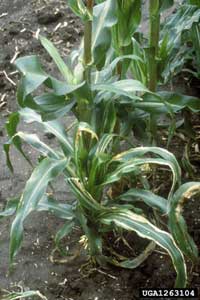Extension > Garden > Diagnose a problem > What's wrong with my plant? > Vegetable > Sweet corn > Spots or streaks on leaves
Sweet corn > Leaves > Spots or streaks on leaves
1 of 7
Common Rust
Puccinia sorghi
- Elongated rusty orange brown streaks on leaves
- Powdery orange spores rub off on hands and tools
- Leaves may turn yellow and become easily tattered in strong winds
- At the end of the season leaf streaks turn black
- More information on Common Rust
2 of 7
Anthracnose Leaf Blight
Colletotrichum graminicola
- Leaf spots start as tan ovals with a brown margin (1/4 – ½ inch long) often surrounded by yellow
- Leaf spots can grow into 5-6 inches long streaks
- Entire leaves may be blighted by leaf spots that have grown together
- Black raised spots with tiny black spines can be seen with a handlens in the center of dead leaf spots
- Infection often starts on the lower leaves early in the growing season and moves progressively up the plant
- More information on Anthracnose Leaf Blight
3 of 7
Northern Corn Leaf Blight
Exserohilum turcicum (syn. Helminthosporium turcicum)
- 1-6 inch elliptical or cigar-shaped spots on leaves that are first gray-green then turn tan
- A distinct margin is present between the infected and healthy tissue
- Lesions may appear "dirty" because of fungal sporulation
- Disease starts on the lower leaves first than moves up the plant
- Disease spreads rapidly in warm (64-80F) wet weather
- More information on Northern Corn Leaf Blight
4 of 7
Gray Leaf Spot
Cercospora zeae-maydis
- Leaves have rectangular lesions which become tan and then gray in color, about 1/8" wide by up to 2"- 3"long
- Lesions have very distinct parallel edges
- More information on Gray Leaf Spot
5 of 7
Eye Spot
Aureobasidium zeae
- Leaf spots are small (1/16" – 1/8") and round
- Leaf spots start as a dark spot with a yellow halo then turn tan with a dark brown or purple margin
- Spots can grow together into larger tan areas
- Common in fields where corn has been grown several years in a row
- More information on Eye Spot
6 of 7
Virus
Dwarf mosaic and maize chlorotic dwarf
- Leaves have light and dark green mottling or streaks
- Infected plants are stunted and may produce many tillers
- Plants may not produce an ear, or ear is poorly developed
- More information on Virus
7 of 7
Stewart's Wilt
Pantoea stewartii
- Plants infected early in the season wilt, remain stunted, and may die
- Plants infected late season have pale-green to yellow streaks with wavy edges run parallel to the leaf veins
- Older leaves may have scorched brown edges
- Cut stalks exude a yellow sticky bacterial slime
- Occurs rarely in Minnesota
- More information on Stewart's Wilt



